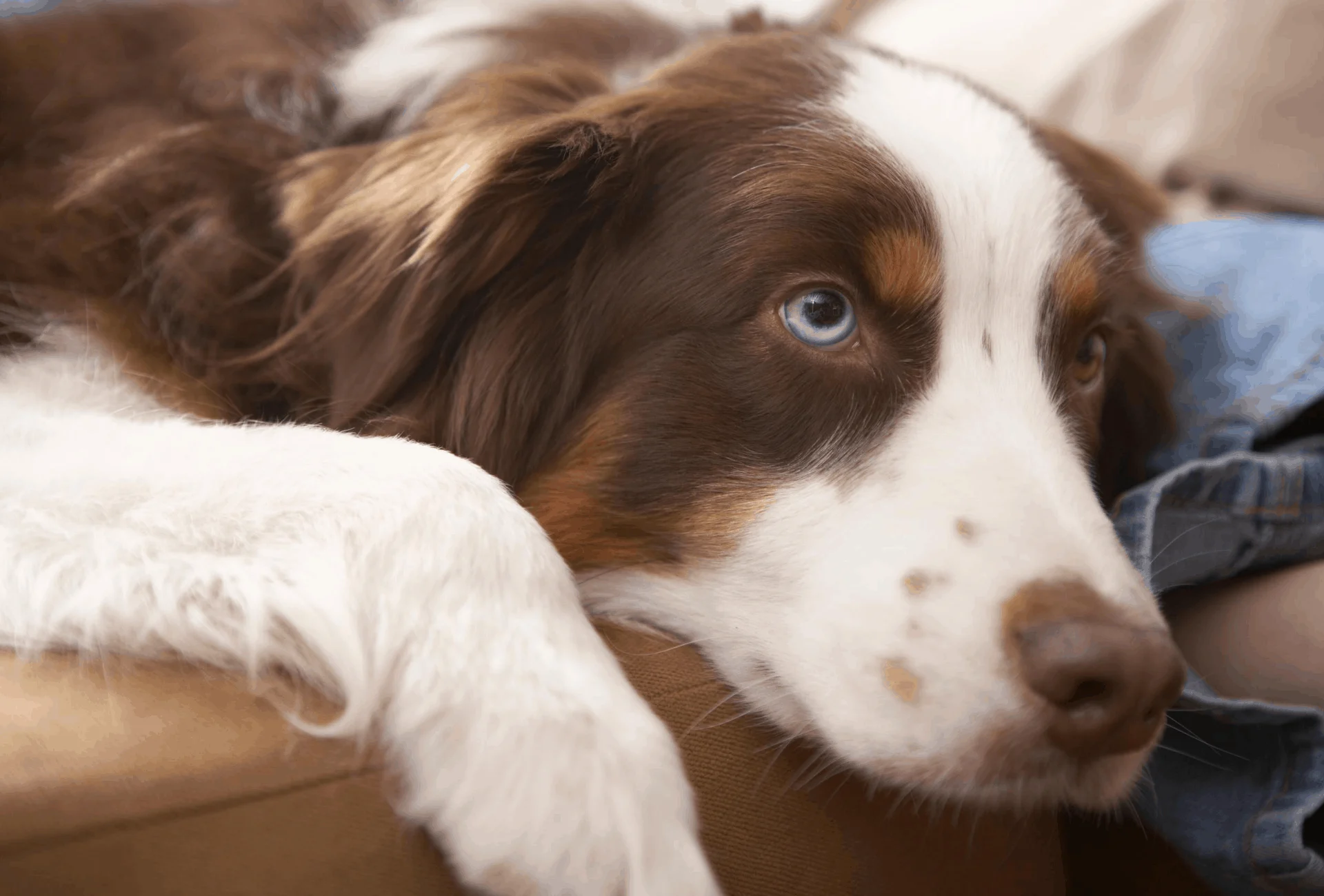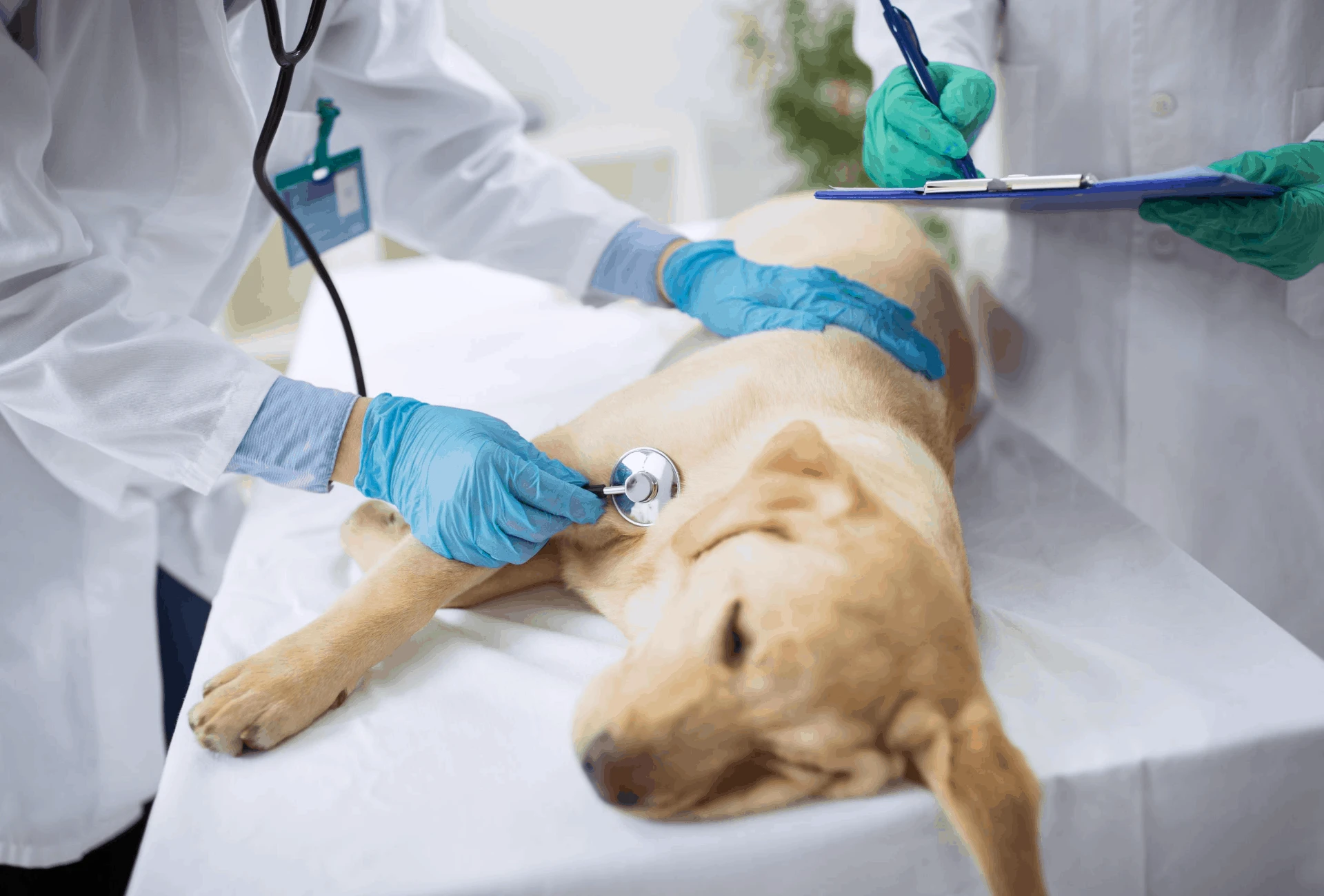A difficult but unfortunate reality of owning a dog is that our dogs aren’t likely to outlive us. At some point, almost all dog owners will be faced with the death of their dog.
Knowing about a dog’s behavior before death, as well as what to expect throughout the process, can help ease the transition.
In this article, we will look at signs and behavior that indicate your dog is dying, if it’s humane to let your dog die naturally, or if you should always visit a veterinarian, as well as what happens afterward.
5 Signs a Dog Is Dying
There are several signs that are often associated with an elderly dog dying. However, many of these signs and symptoms can be related to other, more minor reasons as well.
If you notice your dog experiencing any changes to their behavior or health, the first step is to visit their veterinarian to determine the reason for the changes.
Your dog’s veterinarian will be able to help you figure out the severity of the illness, as well as help keep your dog comfortable.
1. Lethargy
While there are many reasons an older dog may appear lethargic, especially since our pets tend to slow down with age, it is a symptom common to many dying dogs.
If your dog appears to suddenly be more lethargic than usual, or you’ve noticed that they don’t try to engage in any activities that they previously enjoyed, it’s time to visit the vet to discuss their lethargy.
2. Loss of Appetite
Elderly dogs tend to eat less, especially since they don’t need as many calories to maintain their less active lifestyle. However, sudden changes in their desire for food are cause for alarm.
A dog that suddenly stops eating their food is usually in pain or discomfort, which may be associated with other symptoms indicating a dying dog.
However, if your dog is slowly losing appetite, it may just be due to their old age. Since elderly dogs often aren’t able to smell as well, they are sometimes simply not attracted to their food.
Rather than feeding the same kibble, they’ve always eaten, you can try mixing up their food options by feeding wet food, using gravy to entice them to eat, or even home cooking some meals.
3. Changes in Breathing
Your dog may begin to take more shallow breaths or experience labored breathing as they are going through the dying process. This may be due to the underlying reason for their death, or it may be a symptom of another cause.
Any new changes in breathing should be evaluated by your dog’s veterinarian. Sometimes, they may be able to provide medical care to ease your pet’s labored breathing and make them more comfortable.
4. Incontinence
Many dogs nearing the end of their life will lose muscle mass and muscle control, and that includes the ability to control their bladder and bowel movements.

If you’ve discussed the incontinence with your dog’s veterinarian, and there isn’t a medical cause that can be treated, then there are some ways you can help your dog through this process.
Keeping a clean blanket or towel under your dog is an easy way to clean up after an accident, especially since they might be more prone to accidents when sleeping.
It’s also important to not make your dog uncomfortable if they have an accident. They aren’t going to the bathroom inside out of spite, but rather out of an inability to control their bodily functions (or in some cases, a severe cognitive decline).
5. Loss of Interest
One of the signs most common to dying dogs is a loss of interest in things they previously enjoyed.
Whether this is due to your dog becoming withdrawn due to pain and discomfort, or because their cognitive decline prevents them from enjoying activities, a dog that doesn’t want to engage with their world is a dog that may be dying.
In this case, it’s important to visit your dog’s veterinarian as well. If the loss of interest is consistent, it may also be a sign your dog is telling you it’s OK to consider euthanasia.
My Dog Is Dying – How Long Does It Take?
Some sick dogs deteriorate quickly in a matter of hours while for others, the process of dying can take several days or even weeks. There is no specific time range in which a dog will naturally pass away.
Other dogs may appear to be dying for days or weeks before it actually happens.
How long it takes for your dog to die depends greatly on the reason. Dogs with tumors on their spleen may experience a very quick death as the tumor bursts and leads to a lot of internal bleeding.
On the other hand, if your dog is suffering from a slow-progressing illness, there won’t be a specific instance that causes their death, and it can be harder to predict the length of time.
Is It Inhumane to Let a Dog Die Naturally?
The answer to this question depends on the reason your dog is dying. It’s not necessarily inhumane to let your dog die naturally, but it is inhumane to let your dog suffer needlessly.
In fact, the word euthanasia means “good death” because it saves an animal from suffering. Natural deaths are not often very comfortable – for both the dog and the owner to watch.
However, there may be cases where you can make your dog comfortable at home and prepare them for a natural death. The decision to euthanize or wait for natural death is one best made in conjunction with your dog’s veterinarian.
If your dog’s condition can be managed with pain control, and they are likely to pass quickly at home and not suffer, your veterinarian may be able to provide you with the medications to keep your dog comfortable until that time.
On the other side of things, if your dog would likely suffer an uncomfortable, scary, or painful death, making the decision to euthanize your dog is likely the kindest, although certainly not the easiest, option.
When making the decision to euthanize or wait for a natural death, you should also consider your dog’s behavior.
In some cases, a dog may be healthy enough to survive but may be struggling with canine cognitive dysfunction or another disease that leaves them confused and constantly anxious beyond control.
Coupled with poor health due to aging, it may be best to make the decision to euthanize when your dog no longer has good days where they are happy and enjoying their life.

Should You Euthanize a Dog at Home with Benadryl?
No, you should not euthanize your dog on your own. Euthanasia is a medical procedure that should be done carefully under the observation of a veterinarian, and not done on your own.
For one, it’s illegal in many countries to euthanize your own animal. Besides the legalities, however, it’s also not safe for your dog.
Most over-the-counter medications, such as Benadryl, are not intended to euthanize an animal.
Overdosing your pet with medication often leads to organ failure, extreme anemia, or other health problems that make your pet suffer without dying.
Dosing the medication properly for a quick and painless death is almost impossible, and the risks of your pet suffering and then needing emergency vet care or emergency euthanasia at the vet clinic are too high.
Instead, if you want to euthanize your pet while they are at home, you should contact an in-home veterinary team that will come to your home and perform the procedure properly for you.
Can Dogs Sense Their Own Death?
While we can’t know exactly what happens inside our dog’s head, it does appear that some dogs “know” when it’s their time to die. Regardless of whether they truly know, they do appear to display some behavior that is indicative of a dying dog.
As a dog nears its death, they often become more withdrawn from activities that they previously enjoyed. They may also spend more time sleeping and spending time by themselves.
In some cases, you’ll also see your dog become more anxious and frantic as they don’t truly understand what is happening. The behavior that your dog displays at the end of their life can be extremely varied.
Most owners who have euthanized a dog previously will tell you that their dog let them know when it was time.
Whether it was a change in their behavior, a change in their symptoms, or a silently communicated answer, you can help prepare yourself for your dog’s passing by paying attention to these changes.
Do Dogs Prefer to Die Alone?
Since many dying dogs often behave differently, especially by secluding themselves more, it is sometimes thought that dogs prefer to die alone.
In reality, most veterinarians who have euthanized dogs with and without their owners present will tell you that your dog does look for their owner, and is comforted by their presence.
Dogs often seclude themselves simply because they have less energy, and less desire to participate in daily activities. Instead, they seek a quiet corner for an all-day nap.
While some dogs may pass away in their sleep while secluding themselves, it doesn’t mean they necessarily prefer to be alone. Dogs frequently enjoy the comfort of their owners in their final moments.
If you aren’t able to be there for your pet at their euthanasia, however, you can trust that the veterinary staff will do their best to make sure your dog is comfortable.
What to Do with Your Dog’s Body After Death
There are several options for body care after your dog’s death, and the option you choose is completely up to you and your preferences.
One option is to bury your dog’s body. If you live within city limits, there are sometimes rules preventing this, so you should consider checking the local regulations before choosing this option.
If burying your dog on your property is not an option, there are also some pet cemeteries where you can have your dog buried. This way, your dog will always be there, even if you move.
Other than burying your dog, you can also consider having them cremated. This is usually done through your veterinary clinic, but it can be arranged directly with a pet crematorium in some cases, too.
If you choose cremation, you will likely have the choice to receive your dog’s ashes back or not. If you don’t receive ashes back, each crematorium usually has its own way of spreading the ashes in the environment for you.
When you receive your dog’s ashes back, they can be returned to you in a variety of urns, or sometimes a basic cardboard box if you haven’t made a decision yet on which container you’d like to use.
After receiving your dog’s ashes, you may choose to keep them, or you may choose to spread them in places you and your dog enjoyed together.
There are also many companies that will take pieces of the ashes and make jewelry or artwork with them, so you can have your dog close to you.
What Happens When Your Dog Dies at the Vet

If your dog passes away while at the vet clinic, whether naturally or through euthanasia, you can still choose which option you’d prefer for body care. You may choose to bring your pet home for burial or leave them at the vet clinic to be transported for cremation.
In many cases, a veterinary clinic may make you a memorial of your pet, through a clay molded paw print or an ink stamp of their paw.
If you would like to have this memorial of your pet, and you are able to prepare ahead of time, you should inquire with your clinic if it is something that they will do automatically or if you need to specifically request this service.
If you choose to have your dog cremated, your veterinary clinic will usually retain your dog’s body and connect with the crematorium.
Afterward, your dog’s ashes will usually be returned to the veterinary clinic, upon which your vet clinic will call you to let you know you can come to collect your dog’s ashes.
Veterinarians work with dying pets often, and if you have questions about the euthanasia process, most are happy to answer your questions ahead of time to make the process more comfortable.

Darla
Saturday 14th of September 2024
When my dog passes away I plan on putting her ashes in a necklace urn so I can be close to her and take her with me when I pass
Joan
Monday 1st of January 2024
My dog is 14 we are going away for 10 days will that be bad for him we are leaving him at home some one is staying at our house
Danielle Mühlenberg
Thursday 8th of February 2024
Hi Joan, I hope your situation is not related to the article and that your senior dog is actually fine. If you have a familiar person staying with the dog at your own home, it should be fine. However, if the dog is alone for an extended period the first time in their life, that could potentially be a problem.
Lots of preparation, getting familiar with that person, and ideally a healthy bond without preexisting separation anxiety will set you up for success.
Annette
Friday 29th of September 2023
My dog, Poodle mix is always barking at other dogs, what can i do ?
Connie Barnett
Friday 22nd of October 2021
I have an 18 yr old Yorkie that is blind & deaf. She has started having seizure like activity. The vet thinks its more like shes having like hypoglycemic episodes which feeding Nutrical n Honey, not together, feeding a bit more n often, she seem to do better, although she's had 2 since last seeing the vet. Last one was last night, waking up in her sleep, body rigid n shaking n doing like a scream. I snuggled her to me n she was frothing from her mouth. I kept holding her close n she would do a screeching scream, her paws was in a constant scratching at anything movement. She would cut loose barking, but no clue what she's barking at. This went on for 4 1/2 hrs. I let her pace the floor, bumping into objects till I saw her lie down in the floor. I picked her up n laid her on her bed n covered her. She lept for 2 hrs, then after repositioning her, she went back to sleep for 2 more hrs. Ate good for breakfast. I carry her outside to potty. Everything presently, she is back to herself as much as she can be. I was so determined to take her this a.m. to be euthanized n canceled when she started doing better. But another bad night like last night, I will. I did give her some benedryl, small amt. Not to overdose her but help her to try to calm down n rest. My question being, is all this screaming n barking that she did thru this episode because shes in pain or do dogs just do this as part of the dying process?
Danielle
Friday 29th of October 2021
Hey Connie, I'm definitely not an expert when it comes to seizures in dogs so you should consult a specialized vet on whether or not that is normal. With seizures, strange behaviors can happen especially if the dog is disoriented so it's not always clear whether it's the seizure only, pain, or the natural process of dying.
That being said, at 18y of age with her being blind & deaf, you might want to chat with your vet about the quality of life scale. Try to evaluate whether or not it might be worth keeping her especially if her condition improved. Your vet should be able to help you with honestly reflecting on your dog's health status.
Wish you both the best, Danielle
Celia
Wednesday 7th of July 2021
This post was very enlightening! My little 16 year old Yorkie has had all these signs of end of life. She only eats when I feed her, drinks water, and I have to take her outside to pee and poop. I was considering Hospice care so I may need to find a post where it explains the process, I haven't had any luck. I have had my last fur baby euthanized and I still live with their pain, that was back in 2006.
If you have any advice on Hospice care please let me know!
Thank you Celia
Danielle
Thursday 8th of July 2021
Hey Celia,
I'm not very familiar with hospice care for dogs but personally, I'd just contact my vet and then keep your dog at home with you, that's where they should feel safest on earth. What your vet can help with is evaluating the quality of life, if too many boxes are unchecked on the quality of life scale, your vet may discuss euthanization when the times has come.
This avoids a rushed decision as well as unnecessarily letting our pets suffer so it's the ideal choice in my opinion.
Have a great day, Danielle